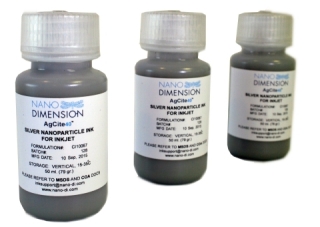Oct 22 2015
Nano Dimension Ltd., a leading printing electronics company in the area of 3D printing, today announced its AgCite™ line of conductive silver nanoparticle inks for inkjet deposition.
 Nano Dimension's AgCite™ Highly Conductive Silver Nanoparticle Inks for Printed Electronics (Photo: Business Wire)
Nano Dimension's AgCite™ Highly Conductive Silver Nanoparticle Inks for Printed Electronics (Photo: Business Wire)
AgCite inks are among the most advanced in the market today, delivering exceptionally reliable printability and outstanding electrical properties while offering significant time and cost benefits over traditional processes used to produce functional electronic devices.
Among its attributes, the AgCite family of inks sinters at low temperatures and is suited to a broad range of substrate surfaces, including paper, polymers, glass and a range of coatings, applied using inkjet printing. Nano Dimension can custom formulate inks for specific printing processes and applications, enhancing adhesion, flexibility and hardness. The formulation expertise makes AgCite inks applicable for a wide variety of advanced printed electronics applications, including RFID, OLED lighting, circuits, screen bezels, solar, sensors and other applications requiring high conductivity.
Digital inkjet printing with AgCite inks offers a number of advantages over screen printing and other analog options that are traditionally used for printed electronics. Benefits include:
- No set-up costs and lower operating costs
- Ability to produce with less material and a cleaner process
- More flexible and precise production process
- Ideal for use in low-volume applications
“Moving to digital inkjet printing requires inks that deliver the best possible electrical properties,” said Simon Fried, Chief Marketing Officer, Nano Dimension. “Our AgCite silver inks have achieved performance levels suited to the most challenging electrical environments, and electronics companies can now seriously evaluate the benefits of digital printing, whatever their application, in the defense, aerospace, automotive, telecom, medical, industrial and consumer electronics industries.”
A patented, highly efficient and environmentally responsible nanoparticle synthesis process enables the unique properties of AgCite inks. The process is licensed through inks pioneer Professor Shlomo Magdassi and Yissum Research Development Company, the technology transfer company of the Hebrew University of Jerusalem. The nanoparticle synthesis process begins with a silver precursor raw material and allows for fine control of the size, shape and distribution of the silver nanoparticles in accordance with customers’ printing requirements. This nanoparticle synthesis process is critical to the types of nanoparticles and ink formulations that can be produced.
Nano Dimension has two fully-equipped laboratories: one dedicated to the research and production of conductive silver nanoparticle inks, and the other focused on innovative dielectric nano-inks. In addition to creating specialty inks for customers, the labs also are focused on nano-silver and nano-polymers for Nano Dimension’s forthcoming 3D printer for multi-layer printed circuit board (PCB) prototypes, the DragonFly 2020 3D Printer.
During Printed Electronics USA 2015 (November 18-19, Santa Clara Convention Center, CA, USA), Nano Dimension will demonstrate the capabilities of its high-performance conductive inks for printed electronics (stand F09). In addition, Nano Dimension’s CMO Simon Fried will give a presentation on “What happens when 3D printing and conductive inks converge?”